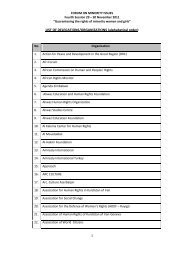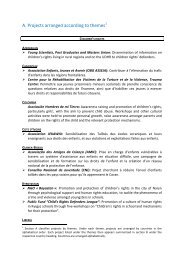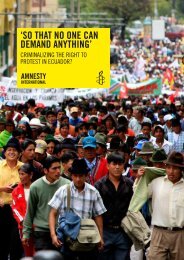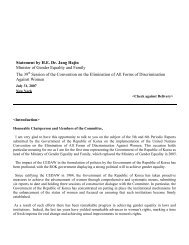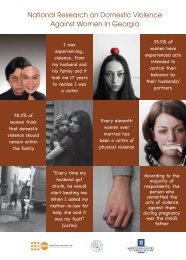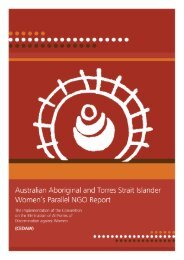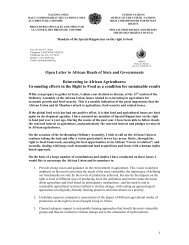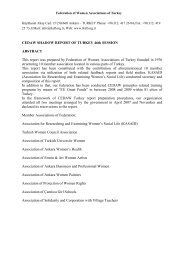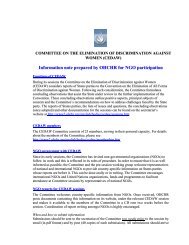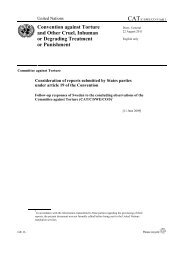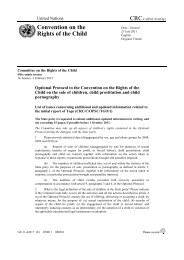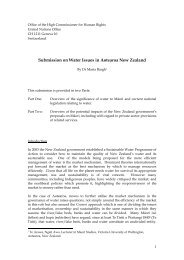Report - Office of the High Commissioner on Human Rights
Report - Office of the High Commissioner on Human Rights
Report - Office of the High Commissioner on Human Rights
- No tags were found...
Create successful ePaper yourself
Turn your PDF publications into a flip-book with our unique Google optimized e-Paper software.
discriminate against people who have sec<strong>on</strong>dary and tertiary rights under customary law (many <str<strong>on</strong>g>of</str<strong>on</strong>g><br />
whom are women). This is a growing category due to <str<strong>on</strong>g>the</str<strong>on</strong>g> increase in inter-clan marriages. Only those<br />
under whose name <str<strong>on</strong>g>the</str<strong>on</strong>g> land is registered will benefit from such a system. Such a system <str<strong>on</strong>g>of</str<strong>on</strong>g> land<br />
registrati<strong>on</strong> will wipe out o<str<strong>on</strong>g>the</str<strong>on</strong>g>r forms <str<strong>on</strong>g>of</str<strong>on</strong>g> customary ownership and access to land. O<str<strong>on</strong>g>the</str<strong>on</strong>g>r countries in<br />
<str<strong>on</strong>g>the</str<strong>on</strong>g> Pacific are attempting to model <str<strong>on</strong>g>the</str<strong>on</strong>g> Native Land Title Board and Fiji system <str<strong>on</strong>g>of</str<strong>on</strong>g> land tenure, but<br />
<str<strong>on</strong>g>the</str<strong>on</strong>g>re are c<strong>on</strong>cerns about whe<str<strong>on</strong>g>the</str<strong>on</strong>g>r this system adequately protects women’s rights. Women need access<br />
to internati<strong>on</strong>al human rights informati<strong>on</strong> to counter not <strong>on</strong>ly patterns <str<strong>on</strong>g>of</str<strong>on</strong>g> traditi<strong>on</strong>al discriminati<strong>on</strong>,<br />
but also <str<strong>on</strong>g>the</str<strong>on</strong>g> loss <str<strong>on</strong>g>of</str<strong>on</strong>g> rights under new systems <str<strong>on</strong>g>of</str<strong>on</strong>g> land and home ownership.<br />
While <strong>on</strong> <str<strong>on</strong>g>the</str<strong>on</strong>g> <strong>on</strong>e hand cultural attitudes perpetuate discriminati<strong>on</strong> against women, women are also<br />
working against <str<strong>on</strong>g>the</str<strong>on</strong>g> breakdown <str<strong>on</strong>g>of</str<strong>on</strong>g> cultural values in <str<strong>on</strong>g>the</str<strong>on</strong>g> Pacific, in particular holistic values that<br />
promote respect and unity between men and women with regard to living <strong>on</strong> <str<strong>on</strong>g>the</str<strong>on</strong>g> land and using<br />
resources. In Papua New Guinea, while <str<strong>on</strong>g>the</str<strong>on</strong>g> c<strong>on</strong>stituti<strong>on</strong> gives people <str<strong>on</strong>g>the</str<strong>on</strong>g> right to own land, many are<br />
selling <str<strong>on</strong>g>the</str<strong>on</strong>g>ir land to make short-term financial gains.<br />
A human rights approach<br />
“If women knew that <str<strong>on</strong>g>the</str<strong>on</strong>g>y had rights we would have a different situati<strong>on</strong>” (Betty Blake, T<strong>on</strong>ga)<br />
Even though <str<strong>on</strong>g>the</str<strong>on</strong>g>re are str<strong>on</strong>g cultural beliefs that favour <str<strong>on</strong>g>the</str<strong>on</strong>g> ownership <str<strong>on</strong>g>of</str<strong>on</strong>g> land by men, sensitive lawmakers<br />
and magistrates could make necessary changes in practice. For instance, individual judges<br />
(particularly if <str<strong>on</strong>g>the</str<strong>on</strong>g>y are foreign judges such as those that operate in <str<strong>on</strong>g>the</str<strong>on</strong>g> Cook Islands) may be able<br />
to give positive interpretati<strong>on</strong>s for women’s rights to land, particularly in cases where widows have<br />
been accused <str<strong>on</strong>g>of</str<strong>on</strong>g> adultery. This has been seen in <str<strong>on</strong>g>the</str<strong>on</strong>g> community paralegal programme where community<br />
paralegals have been lobbying and c<strong>on</strong>vincing <str<strong>on</strong>g>the</str<strong>on</strong>g> police and chief magistrate to uphold people’s human<br />
rights. Training programmes for law enforcers <strong>on</strong> women’s rights have met with success and should<br />
be expanded to legislators, judges, and lawyers.<br />
“Solom<strong>on</strong> Islands has signed CEDAW and CRC. But our community leaders are not aware<br />
<str<strong>on</strong>g>of</str<strong>on</strong>g> <str<strong>on</strong>g>the</str<strong>on</strong>g> C<strong>on</strong>venti<strong>on</strong>s’ obligati<strong>on</strong>s. I spoke with 60 chiefs about human rights, <strong>on</strong>ly five <str<strong>on</strong>g>of</str<strong>on</strong>g><br />
whom were women. This was <str<strong>on</strong>g>the</str<strong>on</strong>g> first awareness raising for chiefs d<strong>on</strong>e in an effort to<br />
engage <str<strong>on</strong>g>the</str<strong>on</strong>g>ir support for introducing changes to culture. After talking about human rights<br />
<str<strong>on</strong>g>the</str<strong>on</strong>g> male chiefs were very angry. They said, “It is our god given right to be leaders –<br />
men have <str<strong>on</strong>g>the</str<strong>on</strong>g> right to decide anything and women should follow”. As a result, men have<br />
made decisi<strong>on</strong>s about <str<strong>on</strong>g>the</str<strong>on</strong>g> land including using it for mining, logging and development<br />
projects. The women chiefs resp<strong>on</strong>ded “it is our god given right to own <str<strong>on</strong>g>the</str<strong>on</strong>g> land and you<br />
cannot decide <strong>on</strong> our right.” This illustrates that when women learn about <str<strong>on</strong>g>the</str<strong>on</strong>g>ir rights,<br />
<str<strong>on</strong>g>the</str<strong>on</strong>g>y can start claiming <str<strong>on</strong>g>the</str<strong>on</strong>g>ir rights. We are now working with women <strong>on</strong> how to use a<br />
rights-based approach to ensure women can decide about <str<strong>on</strong>g>the</str<strong>on</strong>g>ir lands. We need more<br />
acti<strong>on</strong> <strong>on</strong> awareness raising and lobbying about discriminatory cultural and religious<br />
practices and later we can change <str<strong>on</strong>g>the</str<strong>on</strong>g> laws.” (Solom<strong>on</strong> Islands)<br />
Advocacy and awareness am<strong>on</strong>gst lawyers, <str<strong>on</strong>g>the</str<strong>on</strong>g> judiciary and police could lead to an improvement<br />
in <str<strong>on</strong>g>the</str<strong>on</strong>g> situati<strong>on</strong> for women’s land rights. In Fiji, even though traditi<strong>on</strong>ally <strong>on</strong>ly men take part in village<br />
meetings, as a result <str<strong>on</strong>g>of</str<strong>on</strong>g> human rights training with chiefs, <str<strong>on</strong>g>the</str<strong>on</strong>g>y have started to include women in <str<strong>on</strong>g>the</str<strong>on</strong>g>ir<br />
meetings. In some areas women now attend <str<strong>on</strong>g>the</str<strong>on</strong>g> provincial board meetings, are members <str<strong>on</strong>g>of</str<strong>on</strong>g> district<br />
boards, village committees and school committees, and are also becoming more vocal. Overall, <str<strong>on</strong>g>the</str<strong>on</strong>g>re<br />
is less resistance to women’s human rights.<br />
EXECUTIVE SUMMARY 45



